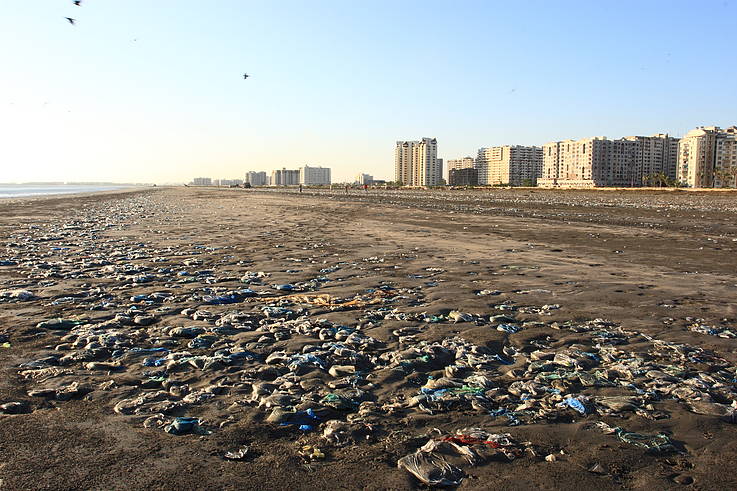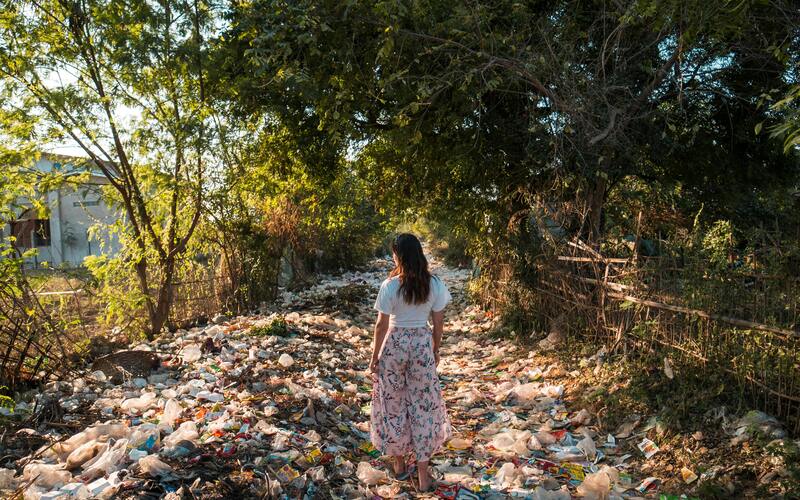For Pakistan’s coastal regions, especially Karachi and Gwadar, plastic pollution has become a serious problem. These regions, which have miles of shoreline and a thriving marine ecosystem, are vital to the sustainability of biodiversity and local livelihoods. However, both are now seriously at risk due to the unrestricted inflow of plastic garbage. This blog examines how plastic pollution threatens Karachi and Gwadar’s coastal communities. It highlights significant impacts that plastic pollution has on marine life and fishing communities, assesses current mitigation strategies critically, and points the way toward long-term fixes.

Impact on Fishing Communities
Plastic pollution disproportionately affects fishing communities in Gwadar and Karachi. The Arabian Sea has been an essential resource for their livelihood and subsistence for many years. Discarded plastics now harm boats, jam fishing nets, and deplete fish populations, which leads to fewer catches. The seriousness of the problem is highlighted by the fact that many fishermen report finding more plastic in their nets than fish.
Furthermore, the wellbeing of the marine ecosystem is closely linked to the livelihoods of these communities. The availability of important species and the general financial stability of local families are both impacted by plastic garbage, which interferes with their mating cycles. In addition to monetary losses, exposure to deteriorated coastal habitats presents serious health hazards since the breakdown of plastic releases harmful chemicals.
Marine Biodiversity at Risk
There is a severe lack of marine life in the coastal seas between Gwadar and Karachi. Particularly at risk are species like dolphins, sea turtles, and other kinds of fish. The prevalence of plastic entanglement and ingestion has skyrocketed, frequently resulting in harm or death. In addition to entering the food chain, microplastics—tiny pieces of broken plastic—have long-term ecological effects that are still little understood.
Layers of plastic waste are choking out coral reefs, which are vital homes for marine life. In addition to endangering biodiversity, this loss also jeopardizes the ecological equilibrium necessary for sustainable fishing methods.
Solutions Implemented So Far
Recognizing the gravity of the situation, a few actions have been done to address plastic pollution:
- Plastic Bag Ban: Single-use plastic bag usage is forbidden by law in the provinces of Sindh and Balochistan. Despite inconsistent enforcement, these policies are a positive beginning. By promoting compliance, public awareness initiatives can increase the impact of these prohibitions even further.
- Beach Cleanups: Local NGOs and projects like WWF-Pakistan often organize beach cleanups, particularly in Karachi. These programs raise public awareness of the problem and help remove large amounts of plastic waste. A sense of shared responsibility among citizens has been established by volunteer participation in these cleanups.
- Recycling Programs: New recycling startups in metropolitan areas are collecting and reusing plastic waste, despite the fact that their impact is limited by scale and practical concerns. These initiatives can be scaled for a greater impact with the assistance of local governments.
- Community Involvement: Efforts to educate surrounding communities about eco-friendly waste management have begun to gain traction, inspiring individuals to adopt eco-friendly practices. Communities are further prepared to embrace sustainable practices through workshops and practical training.
Critical Assessment of Progress
These initiatives are admirable, but they don’t adequately address the structural causes of plastic pollution. Progress is hampered by lax enforcement of prohibitions, inadequate waste management facilities, and a dearth of incentives for changing behavior. For instance, plastic bags are still widely used because of their loose enforcement and lack of substitutes.
Beach cleanups are beneficial, but they only address the surface issue; they don’t address the underlying problem. In a similar vein, recycling programs continue to receive little funding and are unable to handle the enormous amount of plastic waste produced every day. The impact of these initiatives will be minimal in the absence of strong national policies and concerted action.
Path Forward: A Call for Comprehensive Action
For Pakistan to effectively combat plastic pollution, a multipronged approach is required:
- Strengthening Waste Management: Governments must invest in state-of-the-art waste management systems, including source segregation, efficient collection, and expansive recycling facilities. Working together with private companies can hasten the creation of these platforms.
- Alternative Materials: Promote the use of biodegradable materials and offer rewards for innovative, eco-friendly packaging. To investigate more affordable options, research and innovation centers can be established.
- Strict Enforcement: Toughen up the enforcement of plastic bans and punish violators. Frequent monitoring and inspections can increase compliance and discourage infractions.
- Community-Led Solutions: To ensure that local fishing communities gain from and participate in environmental preservation, include them in garbage management initiatives. These communities can also generate value from collected rubbish through training initiatives.
- International Cooperation: To get resources, expertise, and instruments for combating marine pollution, collaborate with international organizations. These collaborations may also open the door to cooperative technology and research exchanges.
References
- Tackling Plastic Pollution in Pakistan. Worldwide Fund for Nature Pakistan (WWF-Pakistan). Retrieved from https://www.wwfpak.org/issues/plastic_pollution/


